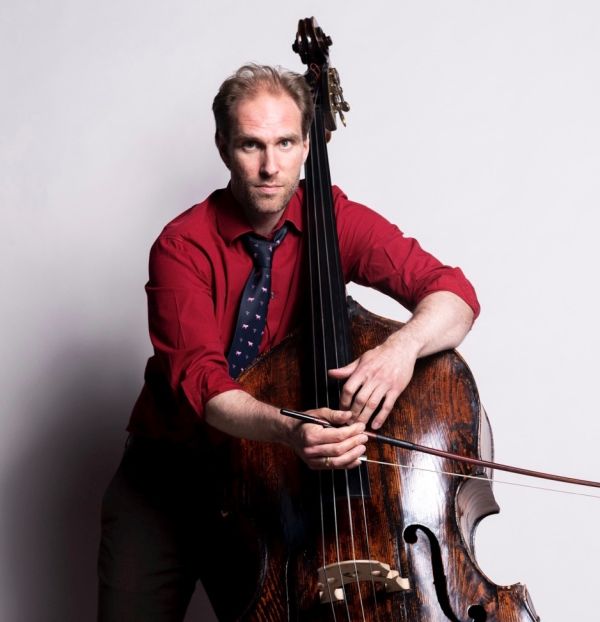
Philipp Stubenrauch
Philipp Stubenrauch holds the position of the principal double bass player with the Bavarian Radio Symphony Orchestra.
He began playing the double bass at the age of 13 and shortly thereafter won the first federal prize for young musicians twice. After studying with Günter Klaus and Franco Petracchi, at the age of 25 he became the first solo double bass player in the Bavarian Radio Symphony Orchestra. Under the direction of chief conductor Mariss Jansons, he performed, among other things, the double bass concerto by J. B. Vanhal. As a chamber musician he performed a.o. with Valery Afanassiev, Maria João Pires, Baiba Skride and Maximilian Hornung. In 2016, together with colleagues from the Munich Music Academy, he founded the Piazzolla ensemble ESCUALO5. Philipp is a lecturer at the Bavarian State Youth Orchestra, at the Schleswig-Holstein Music Festival and has already given master classes in Brazil, Spain, Tokyo and Beijing. Until 2022 he worked for more than ten years at the University of Music and Theater in Munich. He was invited to the Bavarian Bass Days several times as a soloist and lecturer.”(Bearbeitet)Original wiederherstellen
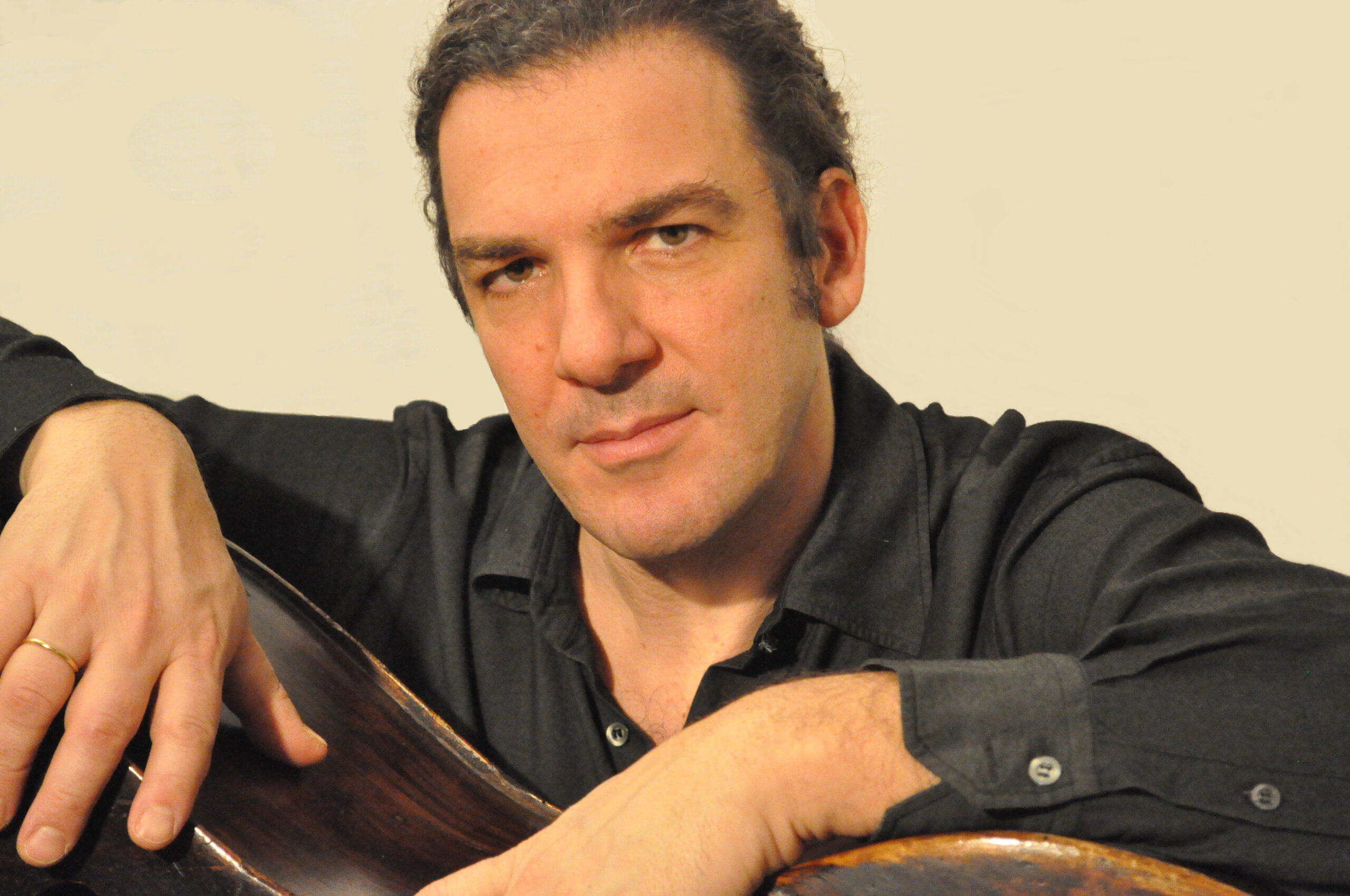
Alberto Bocini
Alberto Bocini born in Prato (Italy). He’s been Principal Double Bass player for 5 years in the “Orchestra Nazionale dell’Accademia di Santa Cecilia” in Rome and for 15 years dell’ “Orchestra del Maggio Musicale Fiorentino” in Florence; with the same role he appeared with many other orchestras, such as La Scala di Milano, I Solisti Veneti, the London Symphony Orchestra.
Founder member of the popular double bass quartet “the Bass Gang”, presenting an extremely heterogeneous repertoire as musical choices, virtuosity and irony.
He has taught masterclasses in much of the world: Europe, Usa, Japan, Taiwan, South America.
As a soloist he has recorded for Denon, Stradivarius, Velut Luna, NBBrecords.
Since he left the orchestra in 2012 he’s dedicating more in writing for his instrument; there are many of his works for solo double bass like his “6 Ballads”; works for double bass and orchestra: “XUITE-0, modular suite for amplified double bass and orchestra”; “Concerto for Double Bass and and “Sliding Doors, for violin, double bass, orchestra and cell ringtones played by audience”
He does not hesitate to push the boundaries of his repertoire ranging over rock music (see the album “The Cryme of Selling Lambs” dedicated to Genesis), soundtracks (see the album “Moving in the Movies”, NBBrecords) or contemporary music (“Braevissimo”, concerto for double bass and strings by Ennio Morricone, for Denon, Japan).
Since 2009 is professor at the HEM – Haute Ecole de Musique de Geneve.
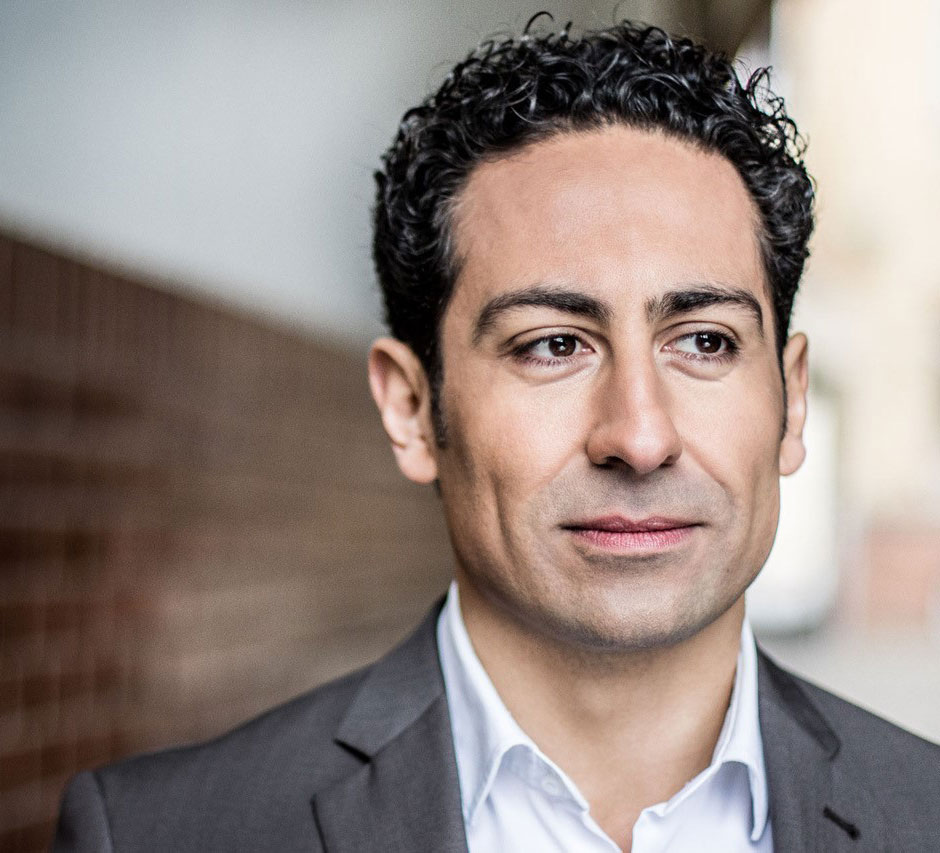
NABIL SHEHATA
“Giving space to music” runs like a thread through Nabil Shehata’s life, both literally and figuratively. As a nine-year-old, the double bass opens the door to, in his words, “the most beautiful repertoire there is” – namely that of classical music. As a young person, he feels the growing desire to be involved in this music as a conductor. Shehata follows this impulse, gives up his position as principal bass player of the Berliner Philharmoniker, and has since successfully embarked on a career as a conductor. A critic recently wrote that he conducts with “authority full of ease” an observation that corresponds precisely with what Shehata is aiming for. “It is about resonating with each other. This is what creates music. This is what I want to achieve with orchestras”. Shehata has developed a conducting style that is closely related to chamber music making, because he is convinced that “this is how music is created that can achieve what audiences, orchestras, and conductors alike desire: unforgettable concert experiences!”. The BBC Music Magazine honoured Nabil Shehata’s realisation of this intention by presenting him with the BBC Music Award for the best orchestral recording 12|2021.
Nabil Shehata’s career began as principal bass player with the Staatskapelle Berlin and the Berlin Philharmonic. As a conductor, he has been mentored and taught by Christian Thielemann, Rolf Reuter, and Lawrence Forster, among others. Since 2019, he has been chief conductor of the Philharmonie Südwestfalen and has recently conducted as a guest, among other ensembles, the Stuttgart Philharmonic, the Munich Radio Orchestra, the Robert Schumann Philharmonic, and the Luxembourg Philharmonic Orchestra. Not long ago, he made his conducting debut with great success at the sold-out Elbphilharmonie. Prior to his current position, he was the chief conductor at the Munich Chamber Opera, and broadened his experience at the Berlin State Opera as an assistant to Daniel Barenboim. As a professor of double bass in Munich and Berlin as well as a member of the West-Eastern Divan Orchestra, he has passed on his experience to younger musicians for many years. In his hometown of Verden, Shehata founded the “Maiklänge” chamber music festival, which is a heartfelt project for him to organize high-quality concerts where he grew up.
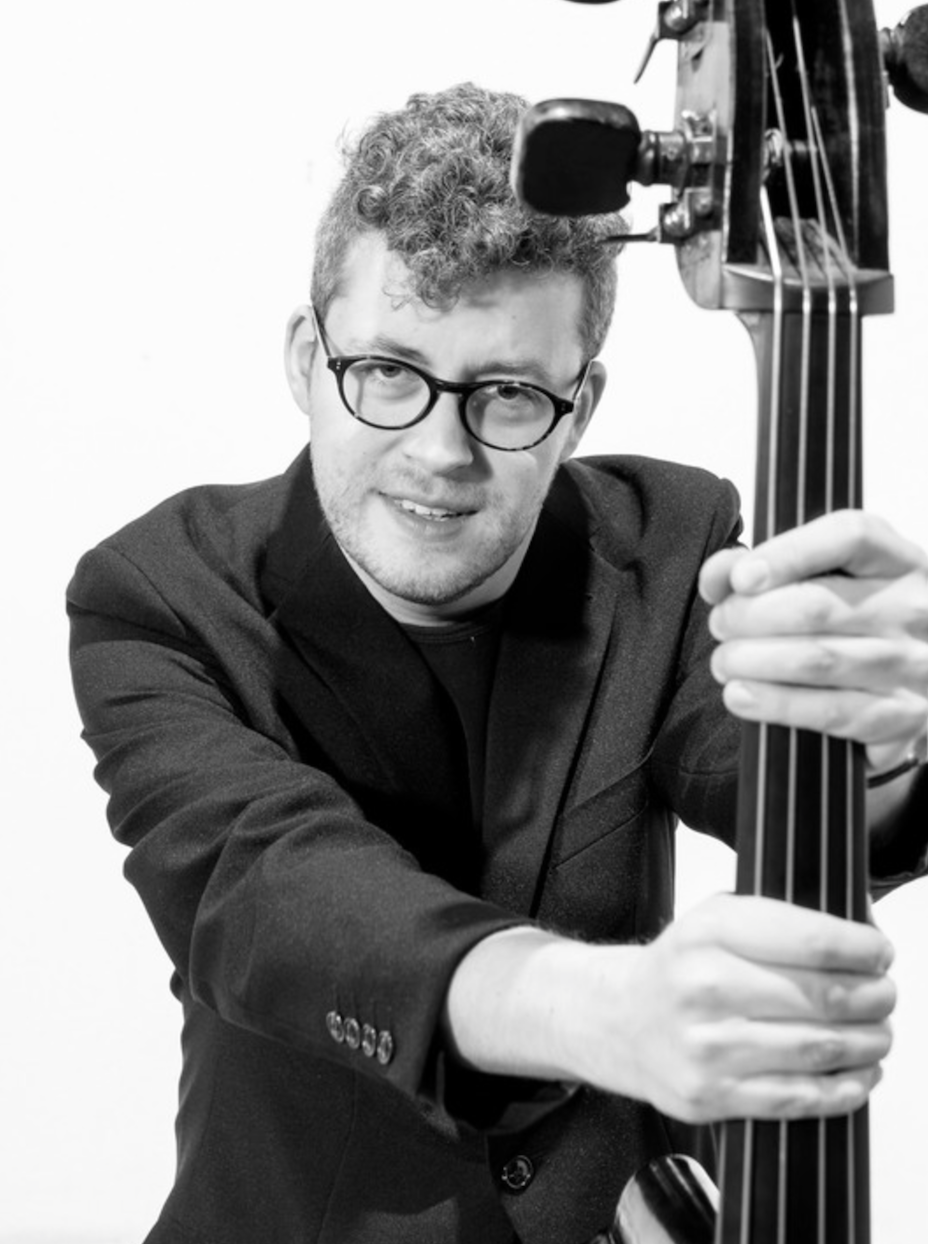
Thomas Hille
Thomas Hille was born in Deggendorf, Germany, in 1990. He was introduced to the world of music early on, and he began playing the piano at the age of five. In 2006, he discovered the double bass and, after just one year with the instrument, became a member of the Bavarian Youth Orchestra. At the time, he was attending the Hochschule für Musik und Theater (University of Music and Performing Arts) in Munich, where he had double bass lessons with Prof. Klaus Trumpf.
In 2009, he began studying under the tutelage of Prof. Dorin Marc in Nürnberg. Around the same time, he became a member of the Young German Philharmonic Orchestra. In 2012, Hille was runner-up at the Johann Matthias Sperger Double Bass Competition, where he also won the audience award and the award for the best interpretation of a Sperger sonata. 2014 saw him receive the Culture Award from his hometown. Hille has had solo concerts with renowned orchestras such as the Symphony Orchestra in Nuremberg, the Neue Lausitzer Philharmonie, and the Rheinische Philharmonie in Koblenz.
He graduated from the Nuremberg conservatory with honors and has had master classes with Božo Paradžik, Catalin Rotaru, and Yasunori Kawahara. Since 2013, Hille has performed in the Orchestra Academy and also as a member of the double bass section of the Munich Philharmonic Orchestra. He has also performed concerts for the Bavarian Radio Symphony Orchestra, the WDR Symphony Orchestra, and the Munich Symphonic Orchestra.
In 2016, he became the principal bass player at the Gärtnerplatz State Theatre in Munich. Since Summer 2016, he has gained experience with modern takes on chamber music as a member of the Bassmonsters.
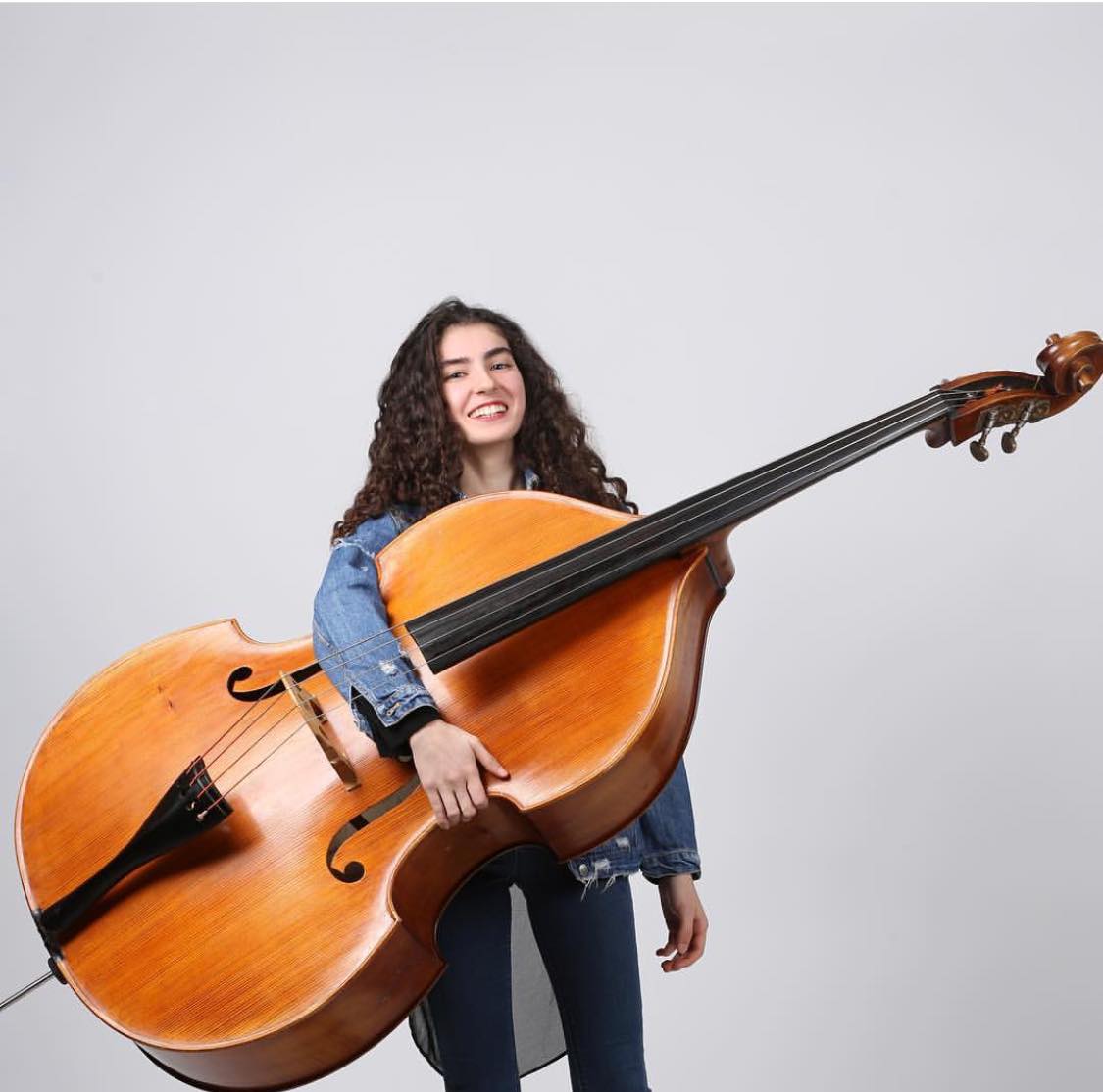
Begüm Aslan
Begüm Aslan is one of the most remarkable musicians of her generation.
Begüm is pursuing her double bass education from Gunars Upatnieks and Nabil Shehata. She took classes with Daniel Barenboim, Michael Barenboim, Michael Wendeberg, Emmanuel Pahud, Sennu Laine, Franco Petracchi, Bozo Paradzik, Dorin Marc, Duncan McTier, Artem Chirkov, Miloslav Gajdos, Dan Styffe, Kaspar Loyal and many more. Also participated masterclasses of Mikhail Gotsdiner and Yuri Gandelsman in 2015. She won various awards and competitions at very early age with her bass playing, such as 1st prize in the International Dittersdorf Competition.
She performed solo and chamber music in the Sion Festival (from 2016 till 2019), BASS2018 Italy, Istanbul Music Festival (2022) and Lucerne Festival (2023). She actively plays in Barenboim-Said Akademie Orchestra with the direction of Daniel Barenboim and Giuseppe Mentuccia, and Lucerne Festival Contemporary Orchestra.
She also performed very diverse solo and chamber music repertoire by composers such as Sofia Gubaidulina, Wolfgang Rihm and Kaija Saariaho’s Folia with Gilbert Nouno (electronics), Krzysztof Penderecki, Adolf Mišek and Erwin Schulhoff under the title of Akademie Concerts in Pierre Boulez Saal, Berlin.
From Sommersemester 2024, she starts her vocal classes as coloratura soprano with Prof. Anna Samuil.
As a self-taught composer, she attended classes from Jörg Widmann and Zeynep Gedizlioglu. Her double bass music described as ‘composer with a poetic charm’ by names such as Lisa Streich and Jörg Widmann. 21 years old musician actively collaborates with contemporary composers and many pieces dedicated to her, such as the extraordinary piece by Stephen Mulligan – Haiku for Voice and Double Bass.
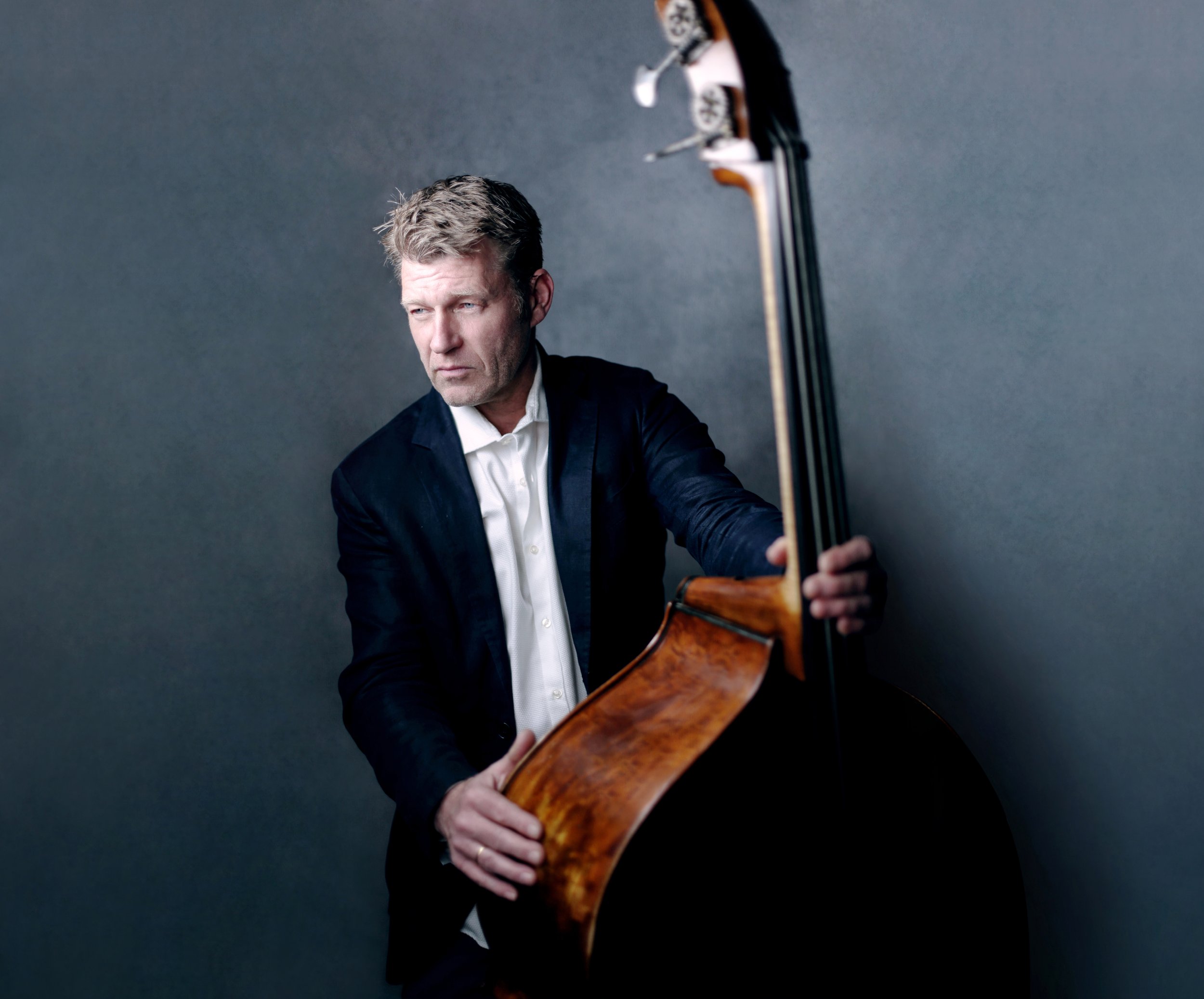
Martin Wind
Bassist and composer Martin Wind was born in Flensburg, Germany in 1968 and has been living in the New York City area since 1996. He earned a diploma as Orchestra Musician at the Cologne Conservatory and completed his master’s degree in jazz composition and performance at NYU.
In 1995 Martin came in third at the International Thelonious Monk Bass Competition in Washington, D.C., and in 1996 he won the first Cognac Hennessy/Blue Note Jazz Search in Germany. In 2000 he was the first jazz musician to win the Cultural Award of his home state Schleswig-Holstein. Martin has released more than 20 albums as leader/co-leader including his debut album “Gone with the Wind” (1993), quartet recordings “Salt & Pepper” (2007) and “Get it?” (2009), as well as the orchestral album “Turn out the Stars – music written or inspired by Bill Evans” (2014) featuring Scott Robinson (tenor sax), Bill Cunliffe (piano) and Joe La Barbera (drums), which Paquito D’Rivera called “disgustingly beautiful”. More recent releases include “Light Blue” (2018) and “White Noise” (2020), both of which received four-star reviews in Downbeat Magazine.
Late 2021 saw the release of his latest album “My Astorian Queen” in celebration of the 25th anniversary of his move to New York City. Martin Wind has recorded and/or performed with the following artists: Guidon Kremer, Christoph Eschenbach, Mstislav Rostopowitch, Lalo Schifrin, Monty Alexander, Pat Metheny, Clark Terry, Slide Hampton, Toots Thielemans, Buddy DeFranco Michael and Randy Brecker, Eddie Daniels, Phil Woods, Johnny Griffin, Bucky Pizzarelli, Johnny Mandel, Frank Wess, James Moody, Hank Jones, John Scofield, Sting, Ann Hampton Callaway, Michel Legrand, Anat Cohen, Benny Green, Vanguard Jazz Orchestra and others.

Theresa Schilling
Theresa Schilling is a double bassist, Violone player and double bass teacher. She completed her bachelor’s and master’s degree in double bass at the Mozarteum Salzburg with Prof. Christine Hoock and was in the Düsseldorfer Symphonikern/ Deutsche Oper am Rhein orchestra Academy for two years. She plays the violone with the Ensemble Bachwerkvokal Salzburg and regularly goes on concert tours at home and abroad. She also played as a substitute in various orchestras such as the Salzburg Philharmonic, the Bad Reichenhall Philharmonic, the Young German Philharmonic, the Tyrolean Symphony Orchestra Innsbruck and the Mozarteum Orchestra Salzburg. She gained further experience on historical instruments with the Theresia Orchestra. She also plays double bass and violone with various chamber music formations at Mirabell Palace in Salzburg. Additionally she went to numerous master classes as well as orchestral and chamber music courses. She is currently studying violone in the class of Prof. Vittorio Ghielmi and instrumental pedagogy. She works as a double bass teacher at the Bad Reichenhall, Berchtesgaden and Laufen music schools.
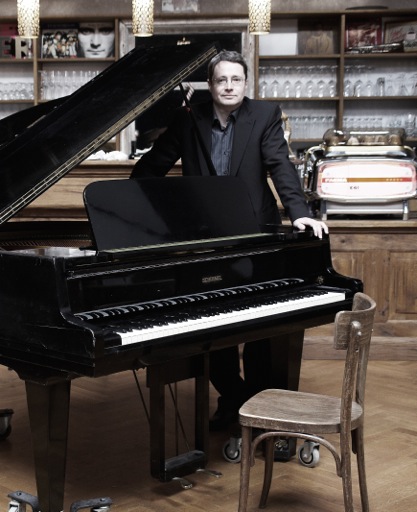
Thomas Hartmann
Thomas Hartmann began his studies at the Richard Strauss Conservatory in Munich in 1986 with Benedikt Koehlen (main subject piano) and Elmar Schloter (additional subject organ) and graduated in 1990 with the music maturity examination. This was followed by master classes with Jürgen Uhde, Ferenc Rhados (piano) and Christian Rieger (harpsichord), among others.
In 2000 he was awarded the Carl Orff Medal by Liselotte Orff.
As a chamber music pianist in various ensembles (Ensemble Amphion), as a sought-after duo partner and song accompanist, he is always an empathetic and stimulating musician.
In recent years he has been increasingly involved in the performance practice of “early music” and playing historical instruments (harpsichord, clavichord).
In the field of solo piano, he feels particularly committed to modern jazz-inspired classics and contemporary music (collaboration with Ambitus – group for new music).
In addition to his work as a pianist, he also performs as an organist as a soloist and in chamber music ensembles.
A large number of “Jugend-musiziert” award winners, professional musicians and passionate amateur musicians resulted from his pedagogical work as a piano teacher at the music school in Traunreut and as a private teacher.
His comprehensive compositional oeuvre ranges from symphonic works (solo concerts), various chamber music ensembles (from duo to decetto) to jazz band compositions and music theater productions.
His works are now performed at well-known festivals such as the Chiemgau Music Spring, the Traunstein Summer Concerts, the Upper Bavarian Culture Days and the Regensburg Jazz Weekend.

 Deutsch
Deutsch